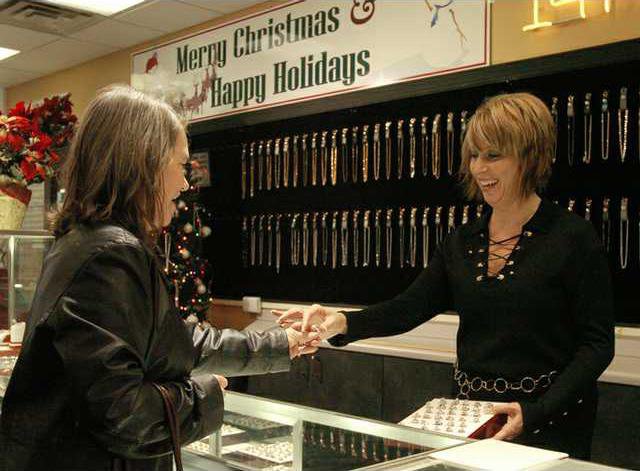Does it bother you when folks greet with "Happy Holidays" instead of "Merry Christmas?" Answer our poll on the home page.
Christmas statement: Read the full statement from Gap Inc. on its holiday practices.
Walk into many retail stores this time of year and you're likely to see signs of the season. Snowflakes, greenery, Christmas trees and sale signs abound, but the word Christmas itself may be hard to find.
Some retailers opt instead to use the word holiday. Other retailers show commercials celebrating Christmas, Hanukkah, Kwanzaa and even Winter Solstice.
But for many in the Hall County area, the word Christmas is a celebration of Jesus Christ, and to leave him out of the season is ignoring the whole point.
"The root of it goes back to the core of what the entire celebration is about," said Mike Taylor, new church start strategist with the Chattahoochee Baptist Association. "And it's about the birth of Jesus Christ. And people become passionate about it because of who he is and what he's done."
Some become quite passionate about it. Focus on the Family for the third year takes retailers to task for using generic language like "holiday." This year, the organization allows customers to rate and comment about retailers on its Web site, StandforChristmas.com. A few stores that rate well? Dillard's, Bass Pro Shops and Kohl's. Best Buy, American Eagle and Gap rate poorly, among others.
Gap Inc. in particular, which owns the Gap, Old Navy and Banana Republic brands, has had negative feedback to its holiday promotions.
One current Gap commercial features dancers saying "Go Christmas," "Go Hanukkah," "Go Kwanzaa," "Go Solstice."
"GAP should be ashamed. Celebrate ‘whatever' on the TV commercials? I'll take my business elsewhere ..." one comment on the Focus on the Family Web site reads.
But balancing tolerance with a religious holiday can be tricky for retailers who want people of any and all beliefs to spend a little money in their stores.
Gap Inc. representatives declined comment on the issue, but directed questions about its policy to a statement released by the company on its Web site.
"Our brands also encourage our store associates to acknowledge, as appropriate, our customers that celebrate the joys of the Christmas season," it states. "At the same time, we recognize and fully appreciate that many of our customers celebrate different holidays around this time and so we focus our marketing on the joys of the holiday season as a whole."
In the Hall County area, local retailers say they haven't had any issues with how they celebrate the season.
"When people come in and we say ‘Merry Christmas,' we have not seen any reaction at all," Gainesville Jewelry owner Phillip Forrester said. "We know our customers, and we haven't had, I can't remember one comment about any way that we've greeted customers coming in the store."
Lorry Schrage, owner of Saul's in downtown Gainesville, said he also has not had any problems. He said as far as the retail business goes, the holiday is more secular than religious, anyway.
Some religious leaders say they understand the retailers' predicament, even if they'd still prefer to hear a cheerful "Merry Christmas."
"When I'm the store and somebody says ‘Happy Holidays' I always, with a grin on my lips and a twinkle in my eye, say ‘Oh, what holiday is that?' and make them say ‘It's Christmas,'" said Steve Winter, executive pastor at Gainesville First United Methodist Church.
He wouldn't boycott a store for using generic language, though, he said. And including other holidays doesn't bother him.
"I just kind of wish people would lighten up and understand the fact that it's Christmas and it's Hanukkah and it's Kwanzaa and just celebrate," he said.
Taylor said he also could understand the difficult marketing situation for retailers, but wishes they could let Christmas be a statement of fact, rather than use generic language.
"What is this season about? It's about the birth of Jesus," Taylor said. "It's not only a religious statement and greeting, it's also a truthful statement of fact. It's what it is. You can say ‘Happy Holidays' or whatever, but doing so bypasses what the history of the celebration is about."
Schrage, who is Jewish, said to be offended by "Happy Holidays" or "Merry Christmas" seems strange.
"Somebody wishes me a Merry Christmas, I take it as a compliment," he said.
Anisah Imes of Gainesville, who is a Muslim, shared similar sentiments.
"I respect the people for their religion. And I just say ‘thank you,' and I say ‘the same to you.' And I just go on about my business," she said.
Some of her friends send her holiday cards, too.
"I have some Jewish friends that wish me Happy Hanukkah. I have some Pan-African friends; they tell me Happy Kwanza. And of course some Christian associates, and they tell me Merry Christmas. So it's not a problem," she said.
Sending Christmas cards is not a problem for Taylor, he said. If someone of another faith doesn't honor those religious convictions, that's their point of view, he said.
"The point is that we're at liberty to value and speak about our convictions," he said.

